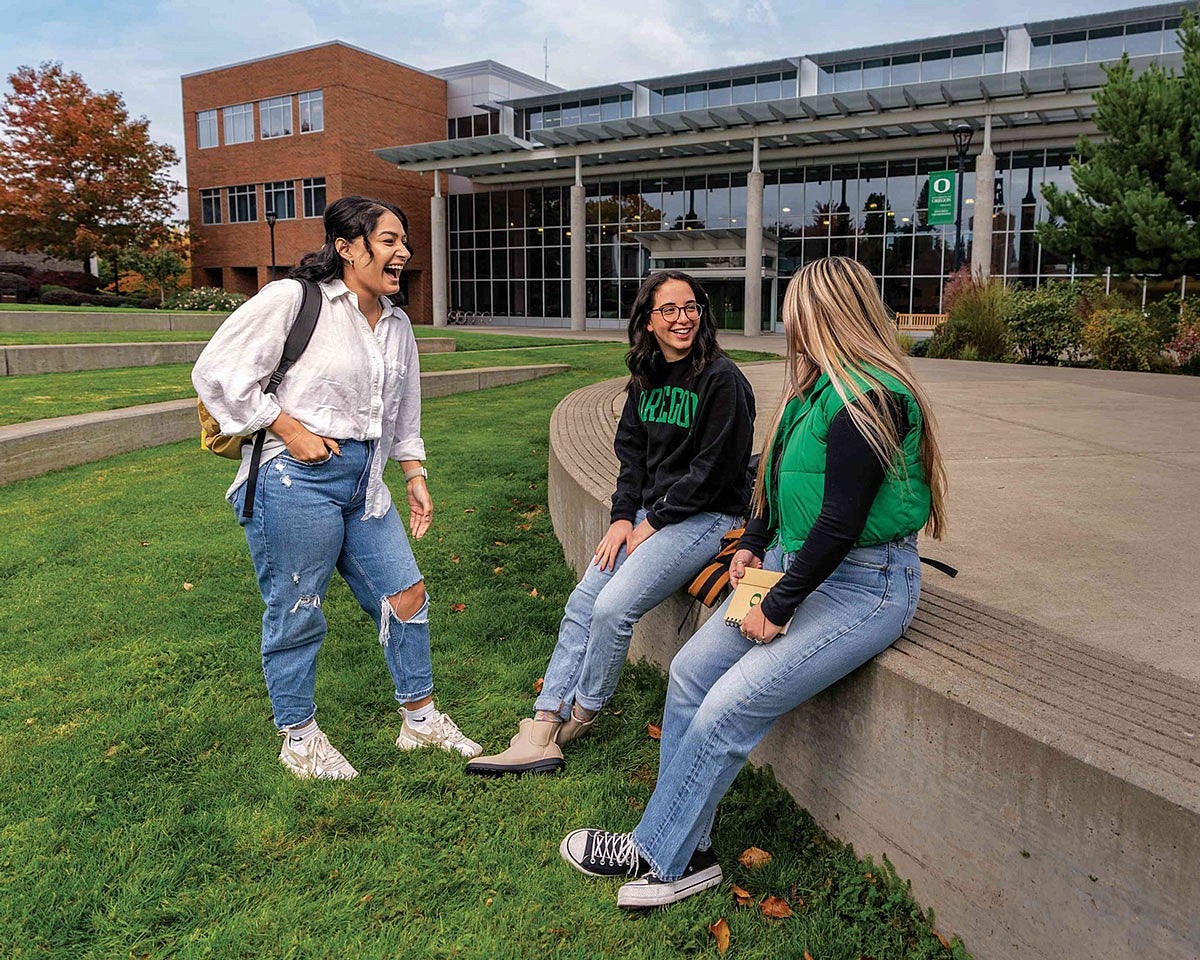A time of breathtaking opportunity.

Karl Scholz
19th President, University of Oregon
Throughout time, universities have created essential knowledge for society, knowledge upon which our technologies, our medicine, and our understanding of history, art, and the world around us are founded.
The challenges we face across our globe are large and complex; they call for big ideas, cross-disciplinary work, critical thought, and dialogue. The solutions they demand require both blue-sky research that envisions the future, and scholarship that delivers insight gleaned from our past. Our mission is to answer that call, and to help individuals question critically, think logically, reason effectively, communicate clearly, act creatively, and live ethically.
This document lays out an ambitious plan that will put the University of Oregon in a stronger position to fulfill that mission in support of our students, our state, and our nation. This plan is also designed to elevate and accelerate the university’s scholarship, particularly in areas where we can be a global leader. The four goals and four signature areas of scholarship we have identified were informed by the thoughts and knowledge of faculty, staff, students, and alumni, and I am deeply grateful for the work of hundreds of people to bring this plan forward.
While this plan defines specific areas of scholarship and focus, our larger aspirations are built on our strength as a diverse, multidisciplinary university. The University of Oregon will continue to support and build scholarship across the array of the humanities, social sciences, physical, biological, and mathematical sciences, the fine and performing arts, and the professional disciplines including architecture, business, design, journalism, and law. From our world-class athletics program to our nationally ranked research enterprise, to the Oregon Bach Festival and our new School of Global Studies and Languages, the University of Oregon aspires to engage the public, educate students, generate new knowledge, and serve society.
As we look to our shared future, we face a world filled with challenges but also with breathtaking opportunity. Our students and state, as well as our industries, communities, governments, and larger society need the contributions of great public research universities like the University of Oregon.
We humbly rise to meet that opportunity.
We invite you to explore the strategic plan for the University of Oregon.
Setting a course for a strong and shared future
On the eve of our sesquicentennial, and with a capital campaign on the horizon, the University of Oregon is at a point of remarkable opportunity.
A community comes together
The strategic planning process was launched in fall 2023. By the end of that year, approximately 1,200 members of the faculty and staff, students, alumni, and other stakeholders had taken the opportunity to provide input through facilitated sessions and an online survey.
In early 2024, informed by this feedback, the leadership team worked to refine the original priorities into four clear goals. President Scholz then charged four cross-functional goal teams to use the community’s input, best practice research, and their own subject matter expertise to propose high-level strategies and measures for evaluating progress. In spring 2024, the community was surveyed again to gather thoughts on the final goals and invite suggestions and ideas related to implementation.
How will we meet this moment?
The answer to this question has the potential to fuel our educational mission, focus our efforts to generate new knowledge, and accelerate the benefits of scholarship for our state, the nation and the world.
We begin in the heart of Oregon where hundreds of staff, faculty, students, alumni, and other members of the university community participated over several months to help chart a shared vision designed to lay a strong foundation for the university for decades to come.
Prioritize work toward our common goals
If everything is a priority, nothing is a priority. Where appropriate, we will curtail work that does not align with the goals outlined in this plan.
Create accountability to meet our goals
We will support units in creating indicators that align with key performance indicators (KPIs). Wherever a unit’s work can be aligned with university goals, strategies, and performance indicators, the leader of that unit will take responsibility for ensuring that this happens. We will align positions, duties, and performance evaluations with the work required to meet our common goals.
Embed an equity-minded approach to our work
We will measure and close equity gaps in all goals and indicators of success. We will ensure there are opportunities for faculty, staff, students, and other stakeholders to contribute input during planning and implementation, and we will use the knowledge collected to inform our work.
Celebrate and share our successes
We will acknowledge individual and group success, and we will seek out less-visible contributors and stories less told. We will develop, distribute, and share our progress with the university community and the wider world and take joy in the accomplishments of students, staff, and faculty.
Break down silos and align our efforts
Responsibility for advancing our priorities is shared. We will collaborate across units to align our work, systems, infrastructure, and resources toward meeting our common goals. Leaders will collaborate with each other and expect collaboration from others.
Acknowledge our people and our financial resources
Unit-level planning should be done based on existing levels of centrally provided funding or resources. We also intend to find ways to raise additional resources to accomplish our goals. In both planning and implementation, we will integrate accountability into current workloads, optimize resources through collaboration, and will use existing structures and meetings whenever possible. We will specifically allocate time to this work, allowing individuals the capacity to engage.
Make data-informed decisions
We will formalize the use of data to inform our decision-making.
TO WHAT DO WE ASPIRE?
We aspire to be a preeminent and innovative public research university committed to enriching the human condition.

Our Four Goals
We strive for excellence in all areas of scholarship and creative work
This includes a sustained commitment to exceptional teaching, discovery, and service, and to our mission as a public research university. We must focus our collective effort in ways that strengthen our ability to fulfill that mission and benefit society.
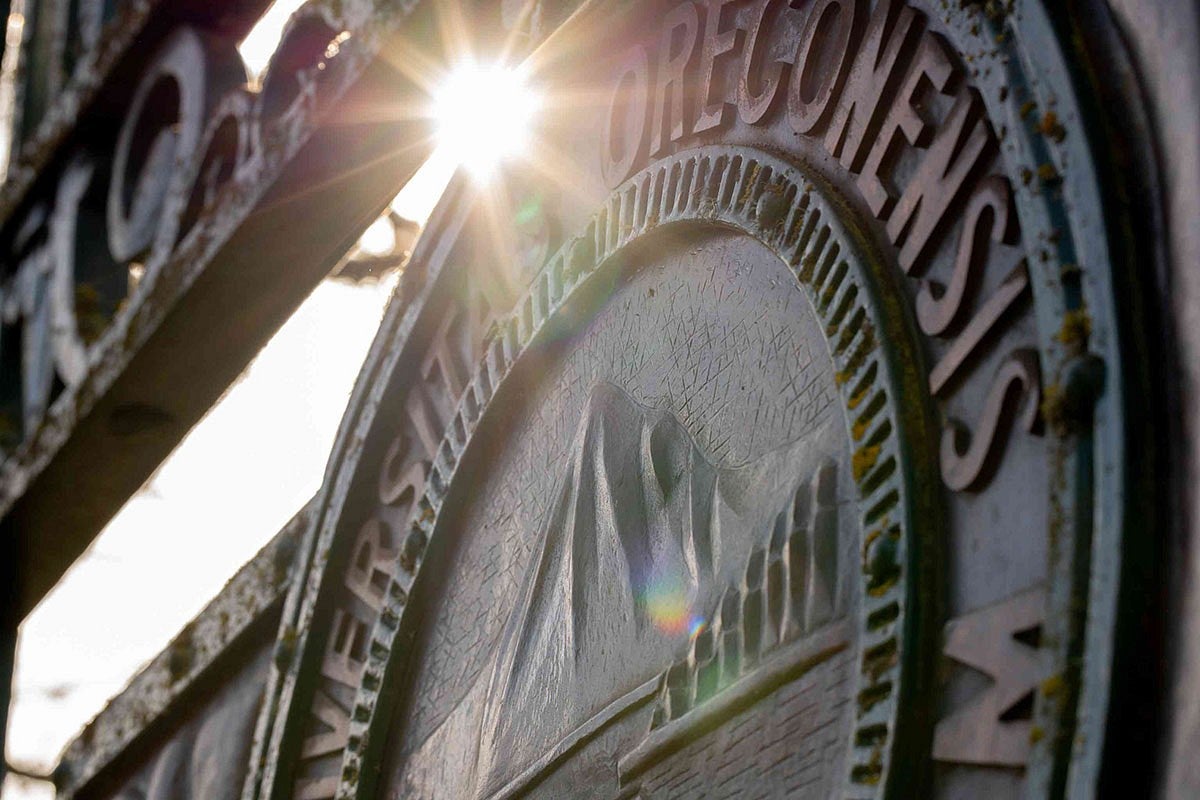
OUR COMMITMENT
Over the next ten years, we commit to achieving substantial and measurable gains across four key goals focused on service to our students, our state, and our people, and increasing the impact of our scholarship to society. We will also focus on four signature areas of scholarship that build on our unique strengths and capabilities. These signature areas provide powerful opportunities to both accelerate our impact and to differentiate the University of Oregon in the crowded field of higher education.
Our success in achieving these goals relies on our ability to align and act on our commitments, and to set measurement approaches that provide both accountability and insight. To that end, KPIs will be identified for each goal, allowing us to track progress and align our efforts.
While our goals are long-term stable targets, ongoing implementation of our plan we will incorporate flexibility. We will build on strategic successes with new ideas, create avenues for broad constituent input to inform potential changes, and adjust course when a strategy proves to be less effective.
Oregon Rising is a collective aspiration—a framework that will guide our decisions, align our efforts, and unlock the potential of the University of Oregon as we move forward into our next decade.
Enhance pathways to timely graduation
ENSURING A ROBUST AND VIBRANT EDUCATION
The University of Oregon is a starting place for the dreams of our students and their families. Students arrive at our university with hopes for successful lives, for fulfilling careers, and for opportunities to contribute to our society at large. This gives us a precious responsibility. Recognizing this, we pledge to support them during their time with us and to enhance pathways to timely graduation and degree completion.
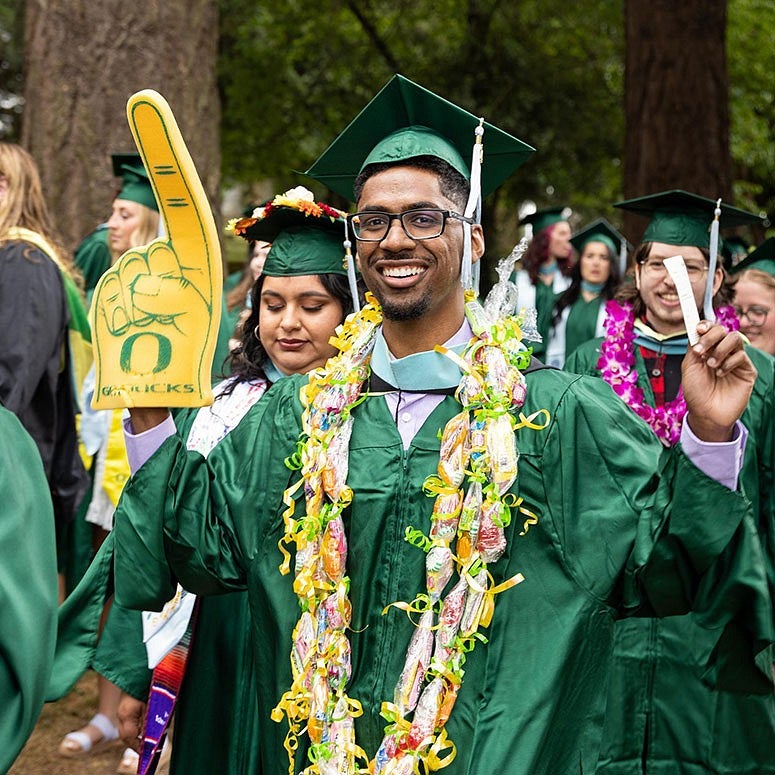
To achieve this goal, we will:
ESTABLISH A POLICY AND PRACTICE ACTION TEAM
Establish a campus-wide student policy and practice action team that serves as the central coordinating body to focus on understanding and removing institutional barriers to timely graduation.
REMOVE INSTITUTIONAL BARRIERS
Mobilize a university-wide “Finish in Four” effort, focused on understanding and removing institutional barriers to on-time graduation. Note: Some of our degree programs are, by design, more than four years. This effort supports and does not alter those programs’ durations.
ANALYZE CURRICULUM
Conduct ongoing, research-informed curriculum analysis and revision to identify and remove barriers to timely graduation.
FOCUS FINANCIAL SUPPORT
Provide effective, targeted financial assistance to support student success.
How we will measure success
- Achieve 70% four-year and 85% six-year graduation rates by 2032.
- Eliminate four-year and six-year graduation rate equity gaps.
These efforts will further enhance student success and degree completion.
Become a leader in career preparation
A DEGREE FROM THE UNIVERSITY OF OREGON SHOULD BE A LAUNCHPAD
We have a responsibility to our students and families to ensure that our students’ time at the University of Oregon prepares them for the opportunities and challenges of a complex, globally connected world. We will meet this responsibility by increasing connections and experiences for students in ways that more directly prepare them for successful pursuits after graduation. Large and small businesses, start-ups, nonprofit organizations, and state and federal government all seek graduates who have developed the skills that prepare them to contribute, innovate, and lead in the modern workplace and in our broader society. Graduates are best served by cultivating such skills through both a rigorous education and opportunities to apply that education in real-world settings.
To that end, we will set in motion a series of initiatives designed to strengthen the connection between academic pursuits and career preparation, bridging the opportunities for our economy, our state, and our nation with the aspirations and talents of our students.
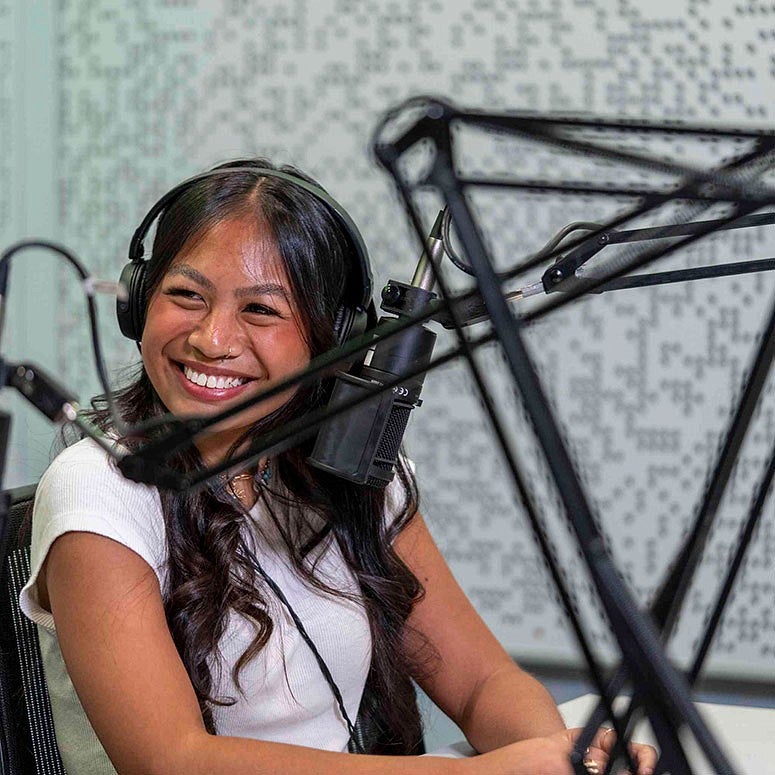
To achieve this goal, we will:
EMBED CAREER-FOCUSED CURRICULUM
Engage and support academic units, faculty, and staff to embed career-focused transferable skills into curriculum.
DEFINE CAREER PREPARATION
Define career preparation and experiential learning to establish a common understanding and language across the university.
LEVERAGE OUR ALUMNI NETWORK
Leverage our alumni network to provide students opportunities for experiential learning, internships, and career opportunities.
FACILITATE ENGAGEMENT
Adopt a campuswide student- and alumni-engagement platform to facilitate engagement.
ESTABLISH CAREER COMMUNITIES
Establish “career communities” to provide industry-informed career guidance for students.
HOW WILL WE MEASURE SUCCESS?
- Significantly increase the percentage of recent degree completers with positive outcomes within six months of graduation.
- To more accurately measure this, we will identify and deploy strategies designed to increase participation in the First Destinations survey.
Such endeavors will prepare students for success in their post-graduation pursuits.
Create a flourishing community
THE UNIVERSITY OF OREGON’S MOST IMPORTANT ASSET IS ITS PEOPLE
To succeed, we know the university must create and sustain a sense of community that can drive alignment, attract talent, and foster the well-being of all. To accomplish this, we will create programs, processes, and structures that will make us known as a university that authentically supports the flourishing of our students, faculty and staff.
WHAT DO WE MEAN BY FLOURISHING?
Flourishing is the holistic development and thriving of every individual in our diverse community achieved through growth, well-being, resilience, trust, belonging, robust connection, and sense of purpose. A flourishing community is built on collective experience and is made stronger by our shared commitment to one another.
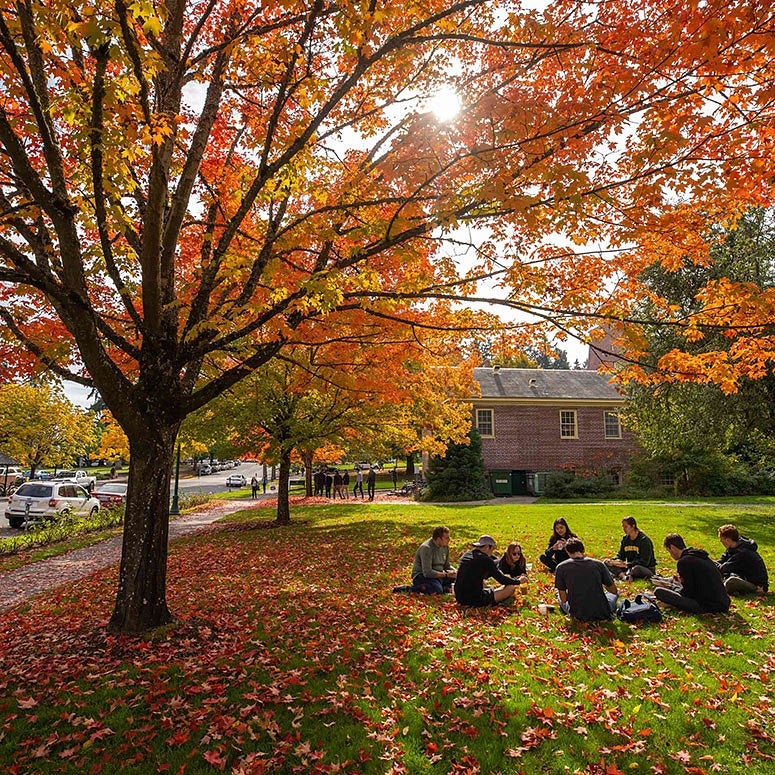
To achieve this goal, we will:
MEASURE COMMUNITY FLOURISHING
Create and adopt a survey-based measure of community flourishing.
ENGAGE AND DEVELOP OUR EMPLOYEES
Coordinate existing employee development and employee engagement opportunities and align these efforts with shared outcomes that enable flourishing and create a respectful and inclusive workplace.
EXPAND ACCESS
Expand access to existing innovative credit-bearing courses that emphasize human flourishing.
ENHANCE BUSINESS OPERATIONS
Enhance business practices, processes, systems, and tools to support the needs of the university community effectively and efficiently.
SUPPORT INFRASTRUCTURE
Support infrastructure to meet the needs of an evolving student population.
RECRUIT AND RETAIN FACULTY
Build on successful efforts to recruit and retain a diverse faculty and staff.
HOW WILL WE MEASURE SUCCESS?
- Percent of flourishing students, both undergraduate and graduate*
- Percent of flourishing employees*
* The university will work to define baseline measures for this goal in the 2024–25 academic year.
Taken together, these efforts will help retain talented students, staff, faculty, and contribute to a sustained sense of community and connection.
Accelerate the University of Oregon’s impact on the world
INNOVATION AT SCALE
As a member of the Association of American Universities (AAU), a group made up of the nation’s leading research institutions, the University of Oregon generates and develops ideas that drive impact. In the next decade, we will apply focus and investment to leverage our “distinctly Oregon” strengths around four signature areas of scholarship that accelerate our benefit on society, elevate the human experience, and develop innovative models for a changing world. In the face of increasingly complex challenges, the University of Oregon is committed to long-term, transformative solutions driven by the latest research and interdisciplinary collaboration.
We will commit to four signature areas of scholarship in areas where we can be a global leader and which will have immediate and beneficial results that improve our world.
HOW WILL WE MEASURE SUCCESS?
- We will double our annual overall research expenditures by 2032.
- We will institute specific metrics that impact individuals, communities, science, industry, and the human condition.
FOUR AREAS OF SIGNATURE SCHOLARSHIP:
ENVIRONMENTAL RESILIENCE
The University of Oregon will create and build on existing programs to develop novel and scalable approaches for mitigating the challenges of a changing climate and adapting to a rapidly evolving world.
YOUTH BEHAVIORAL AND MENTAL HEALTH
The University of Oregon will lead the field in creating and expanding programs designed to support youth well-being through early detection, prevention, and interventions that promote behavioral and mental health, particularly for underserved communities.
HUMAN PERFORMANCE AND SPORT
The University of Oregon will take the next steps to be a world-class university in the study of human performance and sport, leveraging our unique and historical strengths in these areas.
ACCELERATING INNOVATION AND SCIENTIFIC IMPACT
The University of Oregon will create and expand programs and areas of scholarship that promote the effective translation of scientific discoveries into transformative societal benefits to Oregon and the nation.
Environmental Resilience
OUR LEADERSHIP IN THIS AREA
The University of Oregon is a leader in the study and application of environmental science. Through a public-private partnership, and in collaboration with the University of Nevada and UC San Diego, firefighters and communities throughout the Northwest now have access to the world’s largest public-facing system of wildfire cameras. The university is also home to CRESCENT, an NSF-funded, multi-university research effort and the nation’s first subduction zone earthquake hazards center.
Scholarship for a changing planet
The scale and rate of change in the natural environment we are experiencing as a result of human-induced climate change is unprecedented. With these changes comes an increased prevalence and severity of natural catastrophes, displacement and extinction of species, and deleterious effects on agriculture and human health, as well as the pressing need for approaches to safeguard the well-being of vulnerable communities.
OUR COMMITMENT
The University of Oregon will create and build on existing programs to develop novel and scalable approaches for mitigating the challenges of a changing climate and adapting to a rapidly evolving world.
This comprehensive effort includes scientific work to understand and prepare for changing environmental conditions and catastrophic natural events, alongside engineering solutions that reduce carbon dependence; cultural analysis in the humanities and social sciences to explore the ethical and social complexities of climate change and its human impact; efforts in policy, business, education, and law to build resilient communities that can thrive in the face of environmental challenges; and artistic endeavors that capture the urgency of our current environmental crisis and imagine a sustainable and equitable future.

Youth Behavioral and Mental Health
OUR LEADERSHIP IN THIS AREA
The University of Oregon leads the nation in research-based interventions focused on children and youth. Our work includes models for behavioral intervention used in every state in the nation and in more than 25,000 schools. Beginning in 2022, supported by a gift from Connie and Steve Ballmer, we created the Ballmer Institute for Children’s Behavioral Health, introducing a new undergraduate major designed to transform the behavioral health workforce to address the youth mental health crisis.
Meeting societal challenges with strength and resilience
A thriving society in the future depends on how well we meet the needs of children and youth today. Mental health problems have increased dramatically among children and adolescents over the past decade, yet most children in need of mental health support never receive it. Pediatric groups and the U.S. surgeon general have declared a national emergency in child and adolescent mental health.
OUR COMMITMENT
The University of Oregon will lead the field in creating and expanding programs designed to support youth well-being through early detection, prevention, and interventions that promote behavioral and mental health, particularly for underserved communities. This centers evidence-based programs and practices that can be deployed at scale across schools and communities to reduce behavioral health disparities and accelerate societal impact.
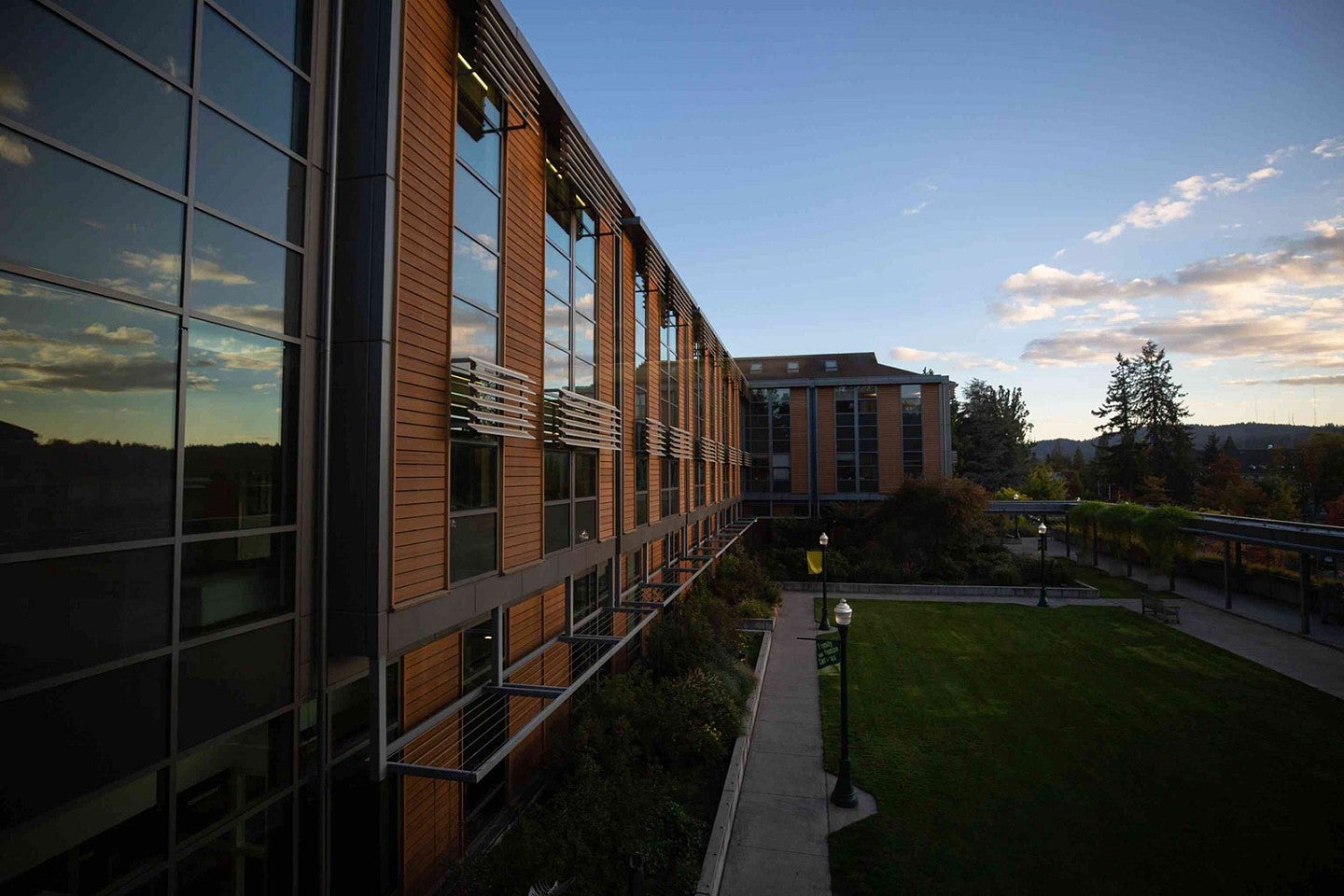
HUMAN PERFORMANCE AND SPORT
OUR LEADERSHIP IN THIS AREA
The University of Oregon is a founding partner in the Wu Tsai Human Performance Alliance, a global effort to promote wellness and peak performance through scientific discovery and innovation. The Graduate Program in Sports Product Design focuses on innovation methodology, athletic performance, sustainability, and sports product marketing. The Warsaw Sports Business Center is the country’s first and finest training ground for sports business.
Defining what’s possible means pushing past limits
We believe that the study of human health and performance can transform health and technology far beyond the realm of competitive sport.
OUR COMMITMENT
The University of Oregon will take the next steps to be a world-class university in the study of human performance and sport, leveraging our unique and historical strengths in these areas. These will include new degree programs, development of professional pathways for our students into related industries, and accelerated scholarship that expands our understanding of human performance and sport through multidisciplinary lenses, including science, business, communications, design, ethics, and law.
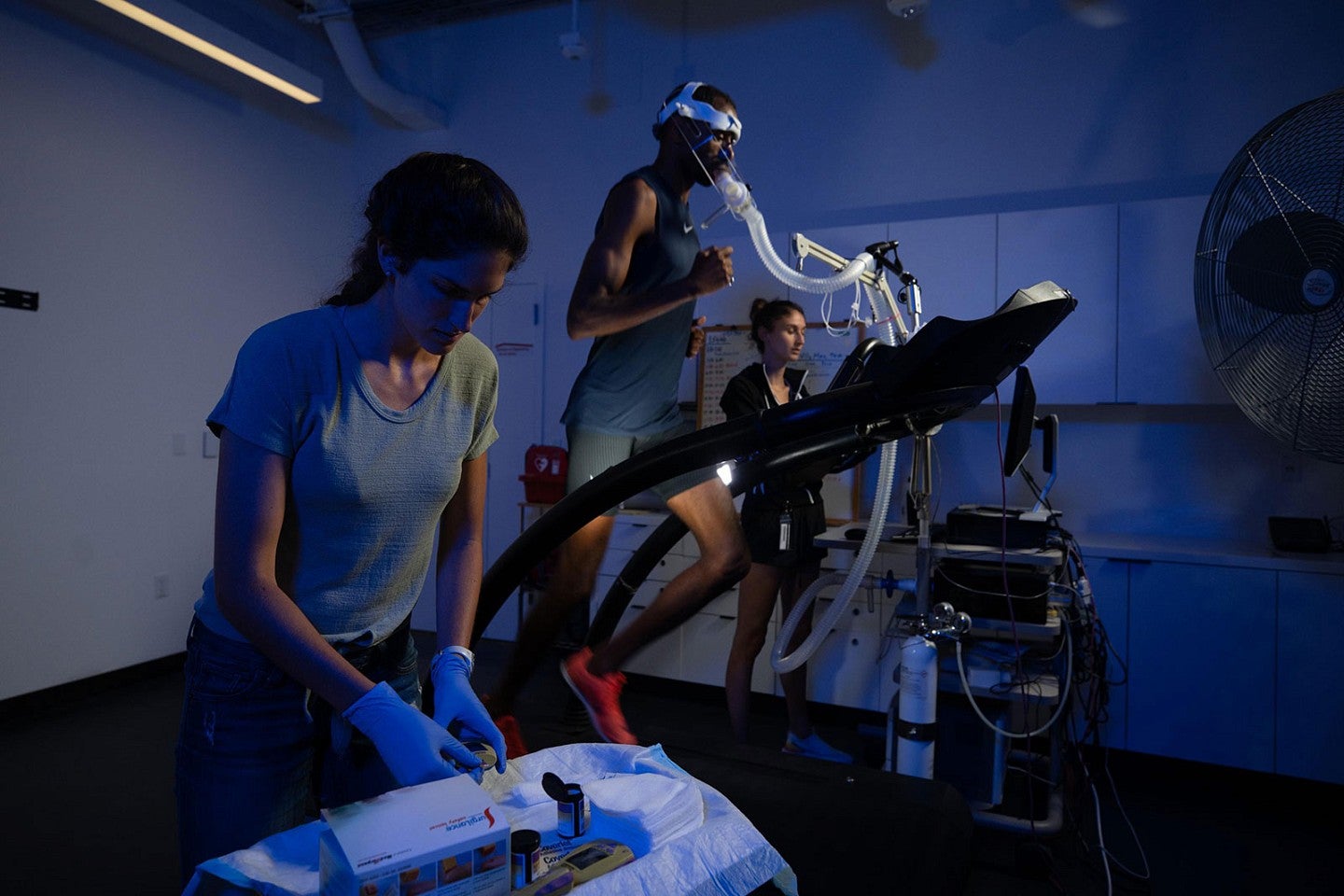
Accelerating Innovation and Scientific Impact
OUR LEADERSHIP IN THIS AREA
The Phil and Penny Knight Campus for Accelerating Scientific Impact is a hub of discovery and innovation where teams of world-class bioengineers and scientists are driving groundbreaking research, novel approaches to technical training, professional development, and entrepreneurship. In 2023, the university founded Launch Oregon, an initiative to translate promising research and innovative ideas into commercially viable ventures, and to provide the capital resources and expertise necessary to propel them from concept to market.
Innovation requires that we imagine the impossible … and then create it
The university’s ability to accelerate the impact of its scholarship requires programs that can rapidly develop useful and novel applications of research.
OUR COMMITMENT
The University of Oregon will create and expand programs and areas of scholarship that promote the effective translation of scientific discoveries into transformative societal impacts. We will support the development and deployment of fundamental research discoveries, technologies, and knowledge that will improve people’s lives and enable the university to amplify its role as a driver for economic prosperity in the region. We will also invest in emerging areas of applied sciences and engineering geared toward addressing major societal challenges. This includes establishing stronger talent and technological pipelines and partnerships to meet the needs of industry and the state; creating a seamless innovation support ecosystem; building infrastructure to accelerate the pathway to societal impact; and removing barriers for individuals historically underrepresented in innovation and entrepreneurship. The University of Oregon will become a destination for those who seek to innovate without being limited by academic silos and barriers that slow the translation of research into practical solutions.
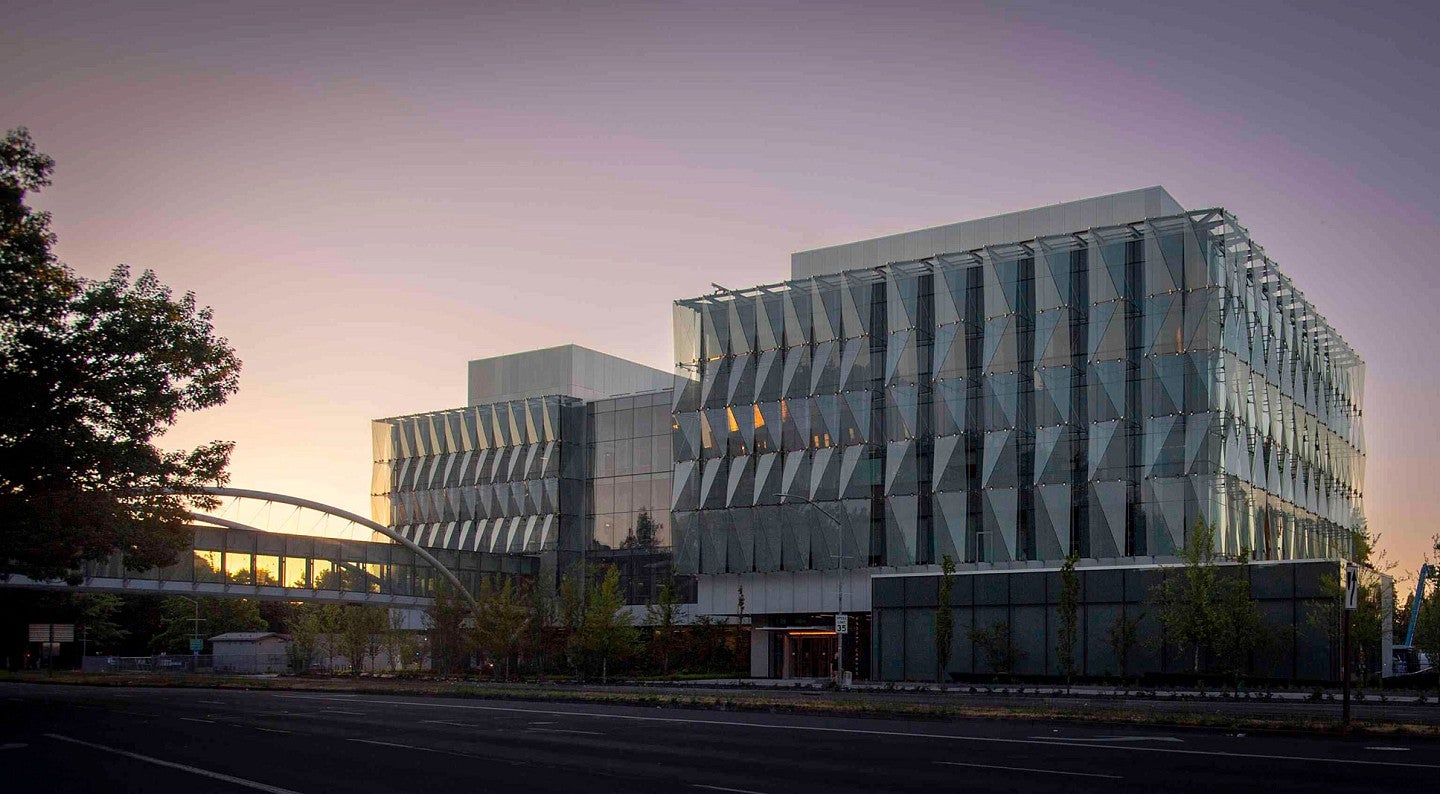
True to our tradition of inquiry, we conclude this plan with a question rather than an answer.
If we are successful in accomplishing these goals, what else would be true?
It is tempting to simply set rankings, or other third-party measures, as the aim of a strategic plan. While our aspiration is certainly to rise in academic standing, such rankings are merely lagging indicators of the reality we commit to create at the University of Oregon over the next decade and beyond. We seek to embody the characteristics of the greatest research universities—not to pursue prestige, but to unleash our potential to conduct research, educate the leaders of tomorrow, and to produce new and useful applications of our scholarship.
Most importantly, if we accomplish the goals laid out in this plan, the University of Oregon will have risen to the pressing challenge to increase the value, benefit, and impact of our work for our students, our state, and our nation.

